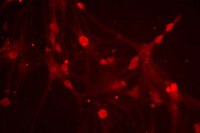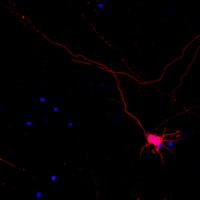Bacteria regulate intestinal epithelial cell differentiation factors both in vitro and in vivo.
Becker, S; Oelschlaeger, TA; Wullaert, A; Vlantis, K; Pasparakis, M; Wehkamp, J; Stange, EF; Gersemann, M
PloS one
8
e55620
2013
Show Abstract
The human colon harbours a plethora of bacteria known to broadly impact on mucosal metabolism and function and thought to be involved in inflammatory bowel disease pathogenesis and colon cancer development. In this report, we investigated the effect of colonic bacteria on epithelial cell differentiation factors in vitro and in vivo. As key transcription factors we focused on Hes1, known to direct towards an absorptive cell fate, Hath1 and KLF4, which govern goblet cell.Expression of the transcription factors Hes1, Hath1 and KLF4, the mucins Muc1 and Muc2 and the defensin HBD2 were measured by real-time PCR in LS174T cells following incubation with several heat-inactivated E. coli strains, including the probiotic E. coli Nissle 1917+/- flagellin, Lactobacilli and Bifidobacteria. For protein detection Western blot experiments and chamber-slide immunostaining were performed. Finally, mRNA and protein expression of these factors was evaluated in the colon of germfree vs. specific pathogen free vs. conventionalized mice and colonic goblet cells were counted.Expression of Hes1 and Hath1, and to a minor degree also of KLF4, was reduced by E. coli K-12 and E. coli Nissle 1917. In contrast, Muc1 and HBD2 expression were significantly enhanced, independent of the Notch signalling pathway. Probiotic E. coli Nissle 1917 regulated Hes1, Hath1, Muc1 and HBD2 through flagellin. In vivo experiments confirmed the observed in vitro effects of bacteria by a diminished colonic expression of Hath1 and KLF4 in specific pathogen free and conventionalized mice as compared to germ free mice whereas the number of goblet cells was unchanged in these mice.Intestinal bacteria influence the intestinal epithelial differentiation factors Hes1, Hath1 and KLF4, as well as Muc1 and HBD2, in vitro and in vivo. The induction of Muc1 and HBD2 seems to be triggered directly by bacteria and not by Notch. | 23418447
 |
Interferon-gamma induced medulloblastoma in the developing cerebellum.
Lin, Wensheng, et al.
J. Neurosci., 24: 10074-83 (2004)
2004
Show Abstract
We have generated a mouse model system with a high incidence of medulloblastoma, a malignant neoplasm believed to arise from immature precursors of cerebellar granule neurons. These animals ectopically express interferon-gamma (IFN-gamma) in astrocytes in the CNS in a controlled manner, exploiting the tetracycline-controllable system. More than 80% of these mice display severe ataxia and develop cerebellar tumors that express synaptophysin, the mouse atonal homolog MATH1, sonic hedgehog (SHH), and Gli1. IFN-gamma-induced tumorigenesis in these mice is associated with increased expression of SHH, and SHH induction and tumorigenesis are dependent on signal transducer and activator of transcription 1 (STAT1). When IFN-gamma expression is shut down with doxycycline at postnatal day 12 (P12), the clinical symptoms dissipate and the mice do not develop tumors, whereas if transgene expression is shut down at P16, the clinical symptoms and tumors progress to lethality, indicating that IFN-gamma is required for tumor induction but not progression. The tumors that occur in the continued presence of IFN-gamma display extensive necrosis and apoptosis as well as macrophage and lymphocytic infiltration, whereas the tumors that develop in mice in which IFN-gamma expression is shut down at P16 do not. Thus, IFN-gamma expression in the perinatal period can induce SHH expression and medulloblastoma in the cerebellum by a STAT1-dependent mechanism, and its continued presence appears to promote a host response to the tumor. | 15537876
 |











